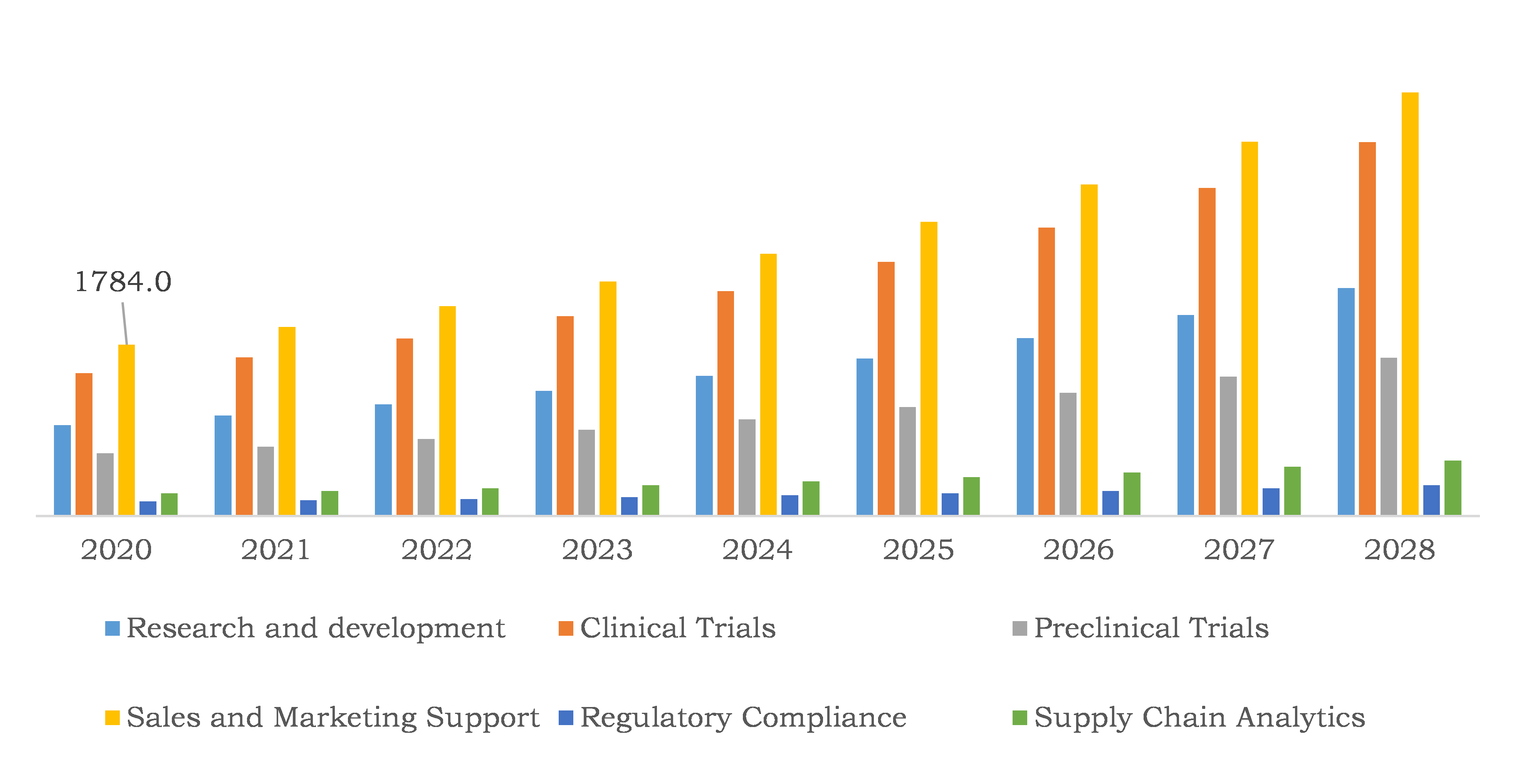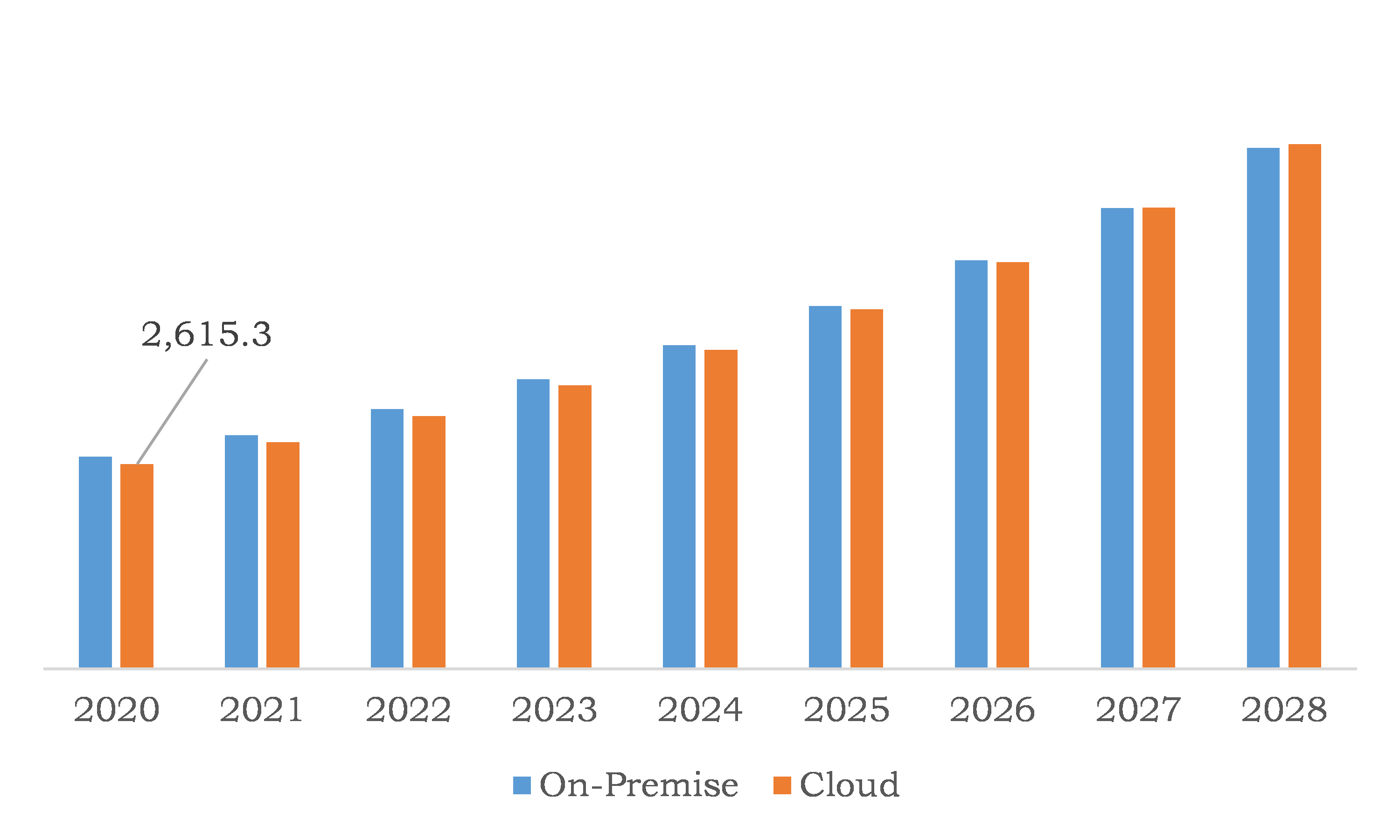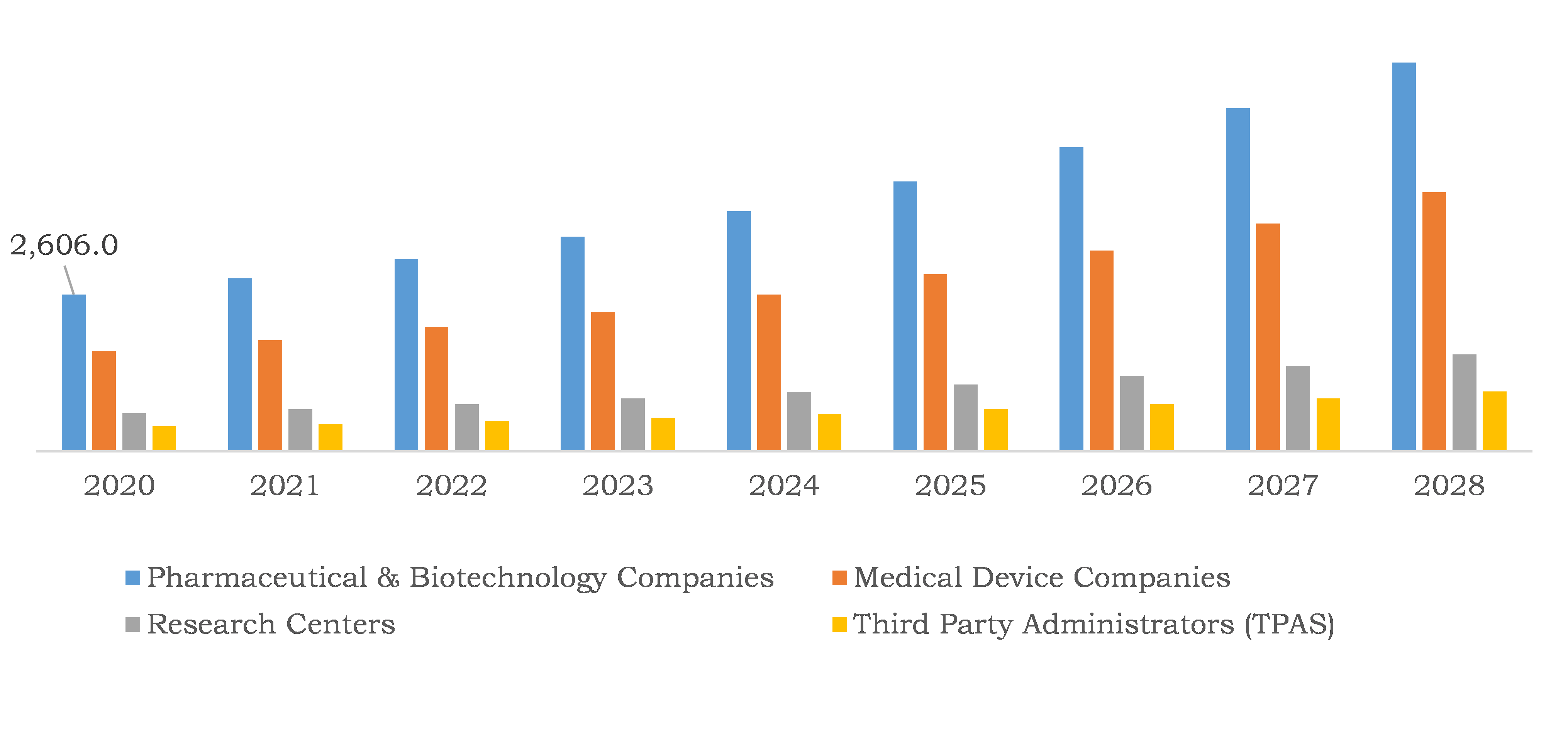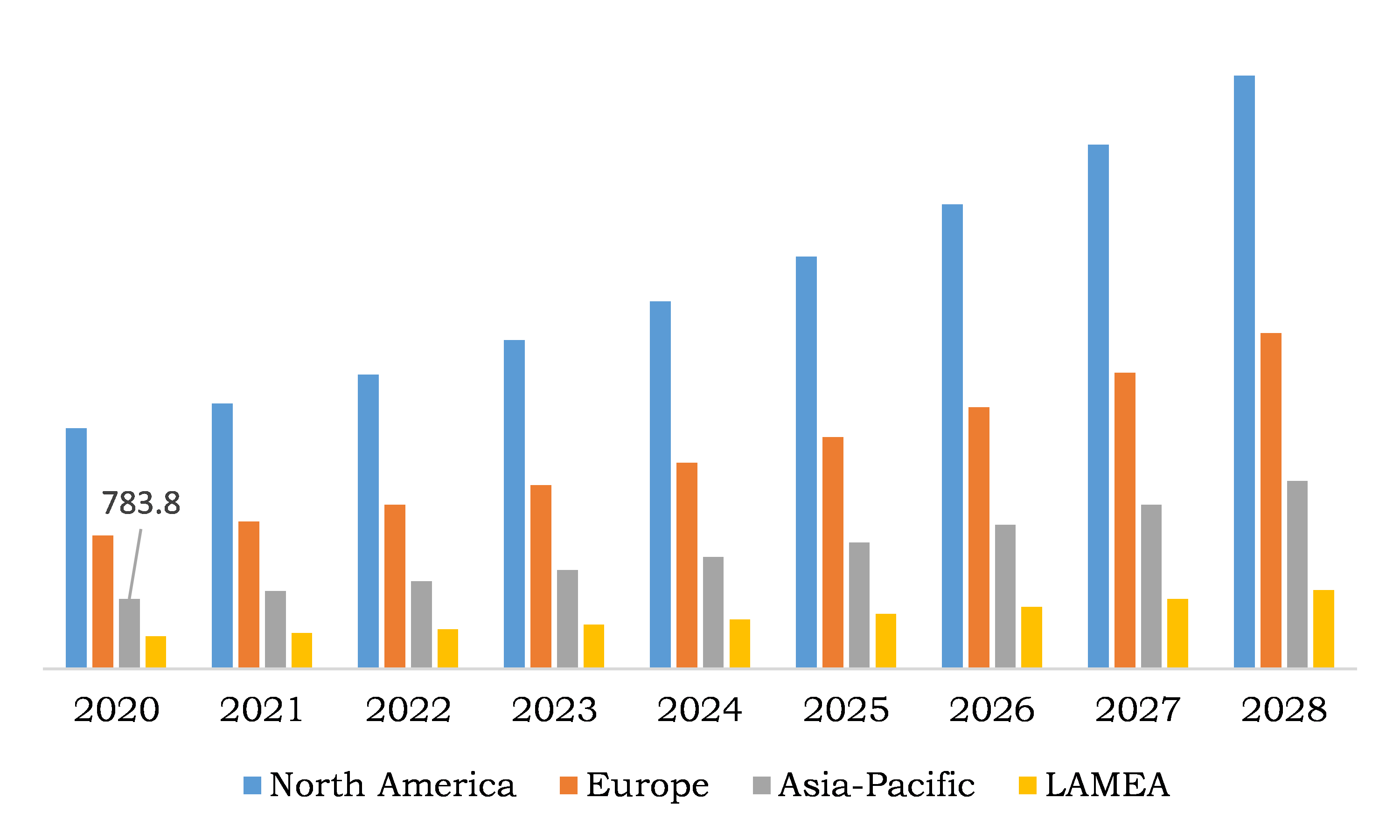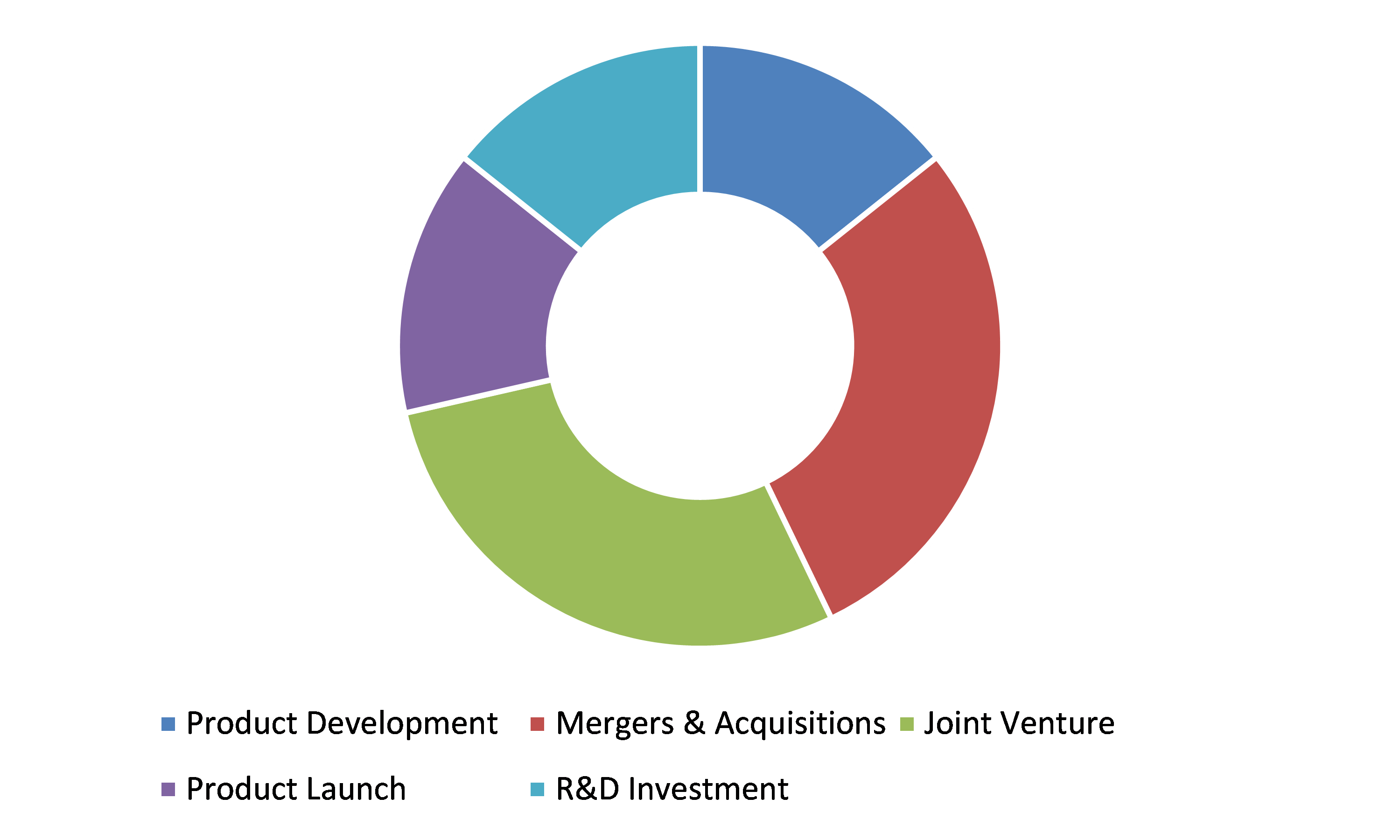Life Science Analytics Software Market Report
RA08419
Life Science Analytics Software Market by Product (Descriptive Analytics, Prescriptive Analytics, and Predictive Analytics), Application (Research & Development, Sales & Marketing Support, Regulatory Compliance, Supply Chain Analytics, and Pharmacovigilance), Delivery Model (On-premise and Cloud), End-user (Pharmaceutical & Biotechnology Companies, Medical Device Companies, Research Centers, and Third-party Administrators), and Regional Analysis (North America, Europe, Asia-Pacific, and LAMEA): Global Opportunity Analysis and Industry Forecast, 2021–2028
Global Life Science Analytics Software Market Analysis
The global life science analytics software market is anticipated to garner $13,375.8 million in the 2021–2028 period, increasing from $5,331.9 million in 2020 at a noteworthy CAGR of 12.4%.
Market Synopsis
Booming adoption of artificial intelligence (AI) in healthcare for enhancing the R&D in analytics software is one of the key drivers for the growth of the life science analytics software market.
However, high costs associated with life science analytical software may hamper the growth of global market, during the analysis period.
According to the regional analysis of the life science analytics software market, the Asia-Pacific market is expected to surge at a CAGR of 13.4% by generating a revenue of $2,100 million, throughout the analysis period.
Life Science Analytics Software Overview
Life science analytics software helps life sciences establishments transform data into life-changing insights. This software is built with innovative technologies to help patient get better with safe therapies. Moreover, this software play key role in resolving the challenges of digital health along with improving the way of discovering, developing, manufacturing, and commercializing effective therapies. Life science professionals, scientists, and clinical researchers require data analysis in order to drive research & innovation and facilitate collaboration. The key advantages of life science analytics software are manifested in widespread areas including strategizing the intent of the patient to real world results, early detection of prescription & treatment patterns, and most importantly achieving the operational excellence to drive through the intellectual journey of patient centricity.
Impact Analysis of COVID-19 on the Global Life Science Analytics Software Market
The life science analytics software has played a significant role, during the COVID-19 pandemic. To cope with the global pandemic, health systems, governments, retail pharmacies, payers, and nonprofits (NPOs) have been working collaboratively in order to provide widespread administration and distribution. Also, share leaders partnered to escalate research and develop the fastest novel technologies, to fight against COVID-19 crisis. For example, in May 2020, Saama Technologies Inc., significant AI-clinical analytics platform firm, and iNDX.Ai, a leading innovative software products company, announced the official launch of the ‘COVID-19 Command Center’. This center is a combination of iNDX.Ai’s iCore software and Saama’s Life Science Analytics Cloud (LSAC) which mainly helps to accelerate the ability of life sciences firms to expedite internal research & development programs for treatment of COVID-19.
Booming Adoption of AI in Healthcare for reshaping the R&D and Commercial Sector to Upsurge the Global Market Growth
Artificial intelligence (AI) is significantly prevalent in society business, and particularly in the healthcare industry. AI is rapidly becoming a key technology for the life sciences field mainly because it provides superior data, better and more efficient drug development procedures, and reduces overall healthcare costs. Also, integration of AI in healthcare analytics software has the potential to transform multiple aspects of patient care, along with administrative processes within payer, provider, and pharmaceutical enterprises. Therefore, increasing awareness about the AI technology in the healthcare sector and hence its eye-catching adoption in the recent years, is one of the major factors, driving the life science analytics market. For instance, Pistoia Alliance, a global, not-for-profit alliance of life science companies, publishers, academic groups, and vendors, has announced the results of a survey regarding the AI and blockchain technology implementation in the life sciences market. The survey showcases that almost 62% of life science professionals say AI may lead to rapid research & development innovations.
To know more about global life science analytics software market drivers, get in touch with our analysts here.
A Higher Initial Investment may Obstruct the Growth of the Global Life Science Analytics Software Market
High implementation cost of life science analytics software is one of the major factors declining the global life science analytics software market growth. Also, lower product penetration, dearth of skilled personnel, and lack of IT infrastructure in the low-income economies; these factors may also restrain the global life science analytics software market, throughout the projected period.
Adoption of Advanced Analytical Tools for the Novel Drug Discovery may Create Enormous Opportunities for the Global Market in the Future
Life sciences sector worldwide has benefitted significantly from the advances in analytical solutions. Emerging technologies such as AI have a huge potential to improve and accelerate drug discovery. Also, AI powered life science analytics software aid in new drug discovery & development, drug repurposing, enhancing pharmaceutical productivity, and others. Also, AI technology minimizes the human workload, eliminates human error and achieves targets in the short time-period. Hence, leading players in the market are coming up with effective strategic collaborations to acquire prominent position in the market, which can also positively affect the global market. For instance, in January 2020, Exscientia, a pharmatech company that uses an end-to-end AI platform to develop new drugs, and Sumitomo Dainippon Pharma, leading Japanese pharmaceutical company, used AI software to develop a drug for obsessive-compulsive disorder (OCD). This drug took only one year for the development processes to reach the trial stage. Above-stated key factors and company developments are anticipated to create massive opportunities, in the coming years.
To know more about global life science analytics software market opportunities, get in touch with our analysts here.
Global Life Science Analytics Software Market, by Product
Based on product, the market has been divided into descriptive analytics, prescriptive analytics, and predictive analytics sub-segments of which the descriptive analytics sub-segment is anticipated to have the largest market share, throughout the forecast period.

Source: Research Dive Analysis
The descriptive analytics sub-segment is expected to have the maximum share in the global market and register a revenue of $5,354.7 million by 2028. Descriptive analytics play crucial role in collecting, organizing, and presenting crucial healthcare data in proper manner. Also, the hospitals and healthcare establishments that adopted descriptive analytics Can reap the benefits of utilizing more advanced level of predictive and prescriptive analytics to enhance patients’ outcome and boost revenue generation.
Global Life Science Analytics Software Market, by Application
Based on application, the market has been categorized into research & development, sales & marketing support, regulatory compliance, supply chain analytics, and pharmacovigilance. Out of these, the sales & marketing support sub-segment is projected to garner the maximum revenue in the global market, in the upcoming years.
Source: Research Dive Analysis
The sales & marketing support sub-segment of the global life science analytics software market is expected to grow at the most notable CAGR and surpass $4,408.9 million by 2028, with a rise from $1,784.0 million in 2020. The growth of the sub-segment might be driven by the significantly increasing adoption of advanced analytics tools by life science companies in order to align their sales & marketing domain. Also, massively growing significance of post-marketing surveillance might accelerate the utilization of analytics software for sales & marketing sub-segment.
Global Life Science Analytics Software Market, by Delivery Model
Based on delivery model, the market has been categorized into on-premise and cloud. Out of these, the cloud subsegment is predicted to grow exponentially in the global life science analytics software industry, during the forecast period.
Source: Research Dive Analysis
The cloud sub-segment of the global life science analytics software market is expected to have the fastest growth and reach up to $6,708.0 million by 2028, with an increase from $2,615.3 million in 2020. The increasing demand for cloud-based life science analytics software is majorly driven by its cost-effectiveness, availability for both small and large healthcare enterprises, and increasing concern to secure healthcare records among the businesses. In addition to this, cloud based analytical tools such as Lore IO and Cloud-specific SAS offerings are the best option for healthcare organizations with a strict financial budget. Hence, the cloud-based analytical software is anticipated to have the fastest growth, during the analysis period.
Global Life Science Analytics Software Market, by End-user:
Based on end-user, the segment has been categorized into pharmaceutical & biotechnology companies, medical device companies, research centers, and third-party administrators. Out of these, pharmaceutical & biotechnology companies sub-segment is anticipated to have a lucrative growth and it is anticipated to generate a notable revenue, throughout the forecast period.
Source: Research Dive Analysis
The pharmaceutical & biotechnology companies sub-segment of the global life science analytics software market is projected to have the dominating share and it is anticipated to cross $6,457.5 million by 2028, with an increase from $2,606.0 million in 2020. Significantly growing adoption of advanced analytical tools for enhancing clinical trial efficiency, increasing drug utilization, and resource management is creating positive impact on the sub-segment’s growth. Also, key role of analytical tools such as GDA 1.1 and DNAuser 1.0 in genome analysis and sequencing may also increase the demand for life science analytics software, in the coming years.
Global Life Science Analytics Software Market, Regional Insights:
The life science analytics software market was investigated across North America, Europe, Asia-Pacific, and LAMEA.
Source: Research Dive Analysis
The Market for Life Science Analytics Software in Asia-Pacific to be the Most Lucrative
Asia-Pacific life science analytics software market accounted $783.8 million in 2020 and is expected to register a revenue of $2,100 million by 2028.
Asia-Pacific region market is predicted to experience massive demand for eye-catching expansion of pharmaceutical & biotechnology firms particularly across India, Australia, China, and Singapore. Supportive government policies, growing prevalence of chronic diseases, and increasing spending on healthcare infrastructure are some of the factors responsible for the healthcare expansion. Also, dramatically growing prevalence of chronic diseases and rising adoption of advanced technologies such as AI and Machine learning (ML) might positively affect the APAC life science analytics market.
The North America Life Science Analytics Software Market to be the Most Dominant
North America life science analytics software market accounted $2,692.6 million in 2020 and is expected to register a revenue of $6,634.4 million by 2028. North America region market dominated the life science analytics software market and accounted for the highest revenue share in 2020, significantly due to factors such as increasing geriatric population, developed and evolving healthcare infrastructure, growing prevalence of non-communicable diseases, and widespread adoption of advanced analytical tools. Also, major technological advancements in healthcare establishments across the U.S., Canada and Mexico may fuel the North America life science analytics software market, during the projected period.
Competitive Scenario in the Global Life Science Analytics Software Market
Product launches and mergers & acquisitions are common strategies followed by major market players.
Source: Research Dive Analysis
Some of the leading life science analytics software market players are SAS Institute Inc., IQVIA HOLDINGS INC., INTERNATIONAL BUSINESS MACHINES CORPORATION, Oracle Corporation, Microsoft, Accenture, Veeva Systems Inc., American Chemical Society (ACS), ArisGlobal, and TIBCO Software Inc.
Porter’s Five Forces Analysis for the Global Life Science Analytics Software Market:
- Bargaining Power of Suppliers: The suppliers operating in the global life science analytics software are high in number and are much larger and more globalized. So, there will be less threat from the supplier.
Thus, the bargaining power of the supplier is moderate. - Bargaining Power of Buyer: Buyers will have less bargaining power, significantly because of less players operating in the global life science analytics software industry.
Thus, the bargaining power of the buyer is moderate. - Threat of New Entrants: The companies entering into the global life science analytics software market are adopting technological innovations such as developing integrated software to attract customers. Also, these companies are implementing various effective strategies and there is government support in some countries.
Thus, threat of the new entrants is high. - Threat of Substitutes: There is no alternative product available.
Thus, the threat of substitutes is low. - Competitive Rivalry in the Market: The competitive rivalry among the industry leaders is rather intense, especially between the global players including SAS Institute Inc., IQVIA HOLDINGS INC., and Oracle Corporation. These companies are launching their value-added services in the international market and strengthening the footprint worldwide.
Therefore, the competitive rivalry in the market is high.
| Aspect | Particulars |
| Historical Market Estimations | 2019-2020 |
| Base Year for Market Estimation | 2020 |
| Forecast timeline for Market Projection | 2021-2028 |
| Geographical Scope | North America, Europe, Asia-Pacific, LAMEA |
| Segmentation by Product |
|
| Segmentation by Application |
|
| Segmentation by Delivery Model |
|
| Segmentation by End-User |
|
| Key Countries Covered | |
| Key Companies Profiled |
|
Q1. What is the size of the life science analytics software market?
A. The global life science analytics software market size was over $5,331.9 million in 2020 and is projected to reach $13,375.8 million by 2028.
Q2. Which are the major companies in the life science analytics software market?
A. SAS Institute Inc., IQVIA HOLDINGS INC., and INTERNATIONAL BUSINESS MACHINES CORPORATION, are some of the key players in the global life science analytics software Market.
Q3. Which region possesses greater investment opportunities in the coming future?
A. The Asia-Pacific region possesses great investment opportunities for the investors to witness the most promising growth in the future.
Q4. What is the growth rate of the Asia-Pacific market?
A. Asia-Pacific life science analytics software market is anticipated to grow at 13.4% CAGR during the forecast period.
Q5. What are the strategies opted by the leading players in this market?
A. Capacity expansion, product development, along with joint ventures are the key strategies opted by the operating companies in this market.
Q6. Which companies are investing more on R&D practices?
A. Oracle Corporation, Microsoft, Accenture, and Veeva Systems Inc. companies are investing more on R&D activities for developing new products and technologies.
1.Research Methodology
1.1.Desk Research
1.2.Real time insights and validation
1.3.Forecast model
1.4.Assumptions and forecast parameters
1.4.1.Assumptions
1.4.2.Forecast parameters
1.5.Data sources
1.5.1.Primary
1.5.2.Secondary
2.Executive Summary
2.1.360° summary
2.2.By product trends
2.3.By application trends
2.4.By delivery model trends
2.5.By end user trends
3.Market overview
3.1.Market segmentation & definitions
3.2.Key takeaways
3.2.1.Top investment pockets
3.2.2.Top winning strategies
3.3.Porter’s five forces analysis
3.3.1.Bargaining power of consumers
3.3.2.Bargaining power of suppliers
3.3.3.Threat of new entrants
3.3.4.Threat of substitutes
3.3.5.Competitive rivalry in the market
3.4.Market dynamics
3.4.1.Drivers
3.4.2.Restraints
3.4.3.Opportunities
3.5.Technology landscape
3.6.Regulatory landscape
3.7.Patent landscape
3.8.Pricing overview
3.8.1.By Product
3.8.2.By Application
3.8.3.By Delivery Model
3.8.4.By End-User
3.9.Market value chain analysis
3.9.1.Stress point analysis
3.9.2.Raw material analysis
3.9.3.Manufacturing process
3.9.4.Distribution channel analysis
3.9.5.Operating vendors
3.9.5.1.Raw material suppliers
3.9.5.2.Product manufacturers
3.9.5.3.Product distributors
3.10.Strategic overview
4.Life Science Analytics Market, by Product
4.1.Descriptive Analytics
4.1.1.Market size and forecast, by region, 2020-2028
4.1.2.Comparative market share analysis, 2020 & 2028
4.2.Prescriptive Analytics
4.2.1.Market size and forecast, by region, 2020-2028
4.2.2.Comparative market share analysis, 2020 & 2028
4.3.Predictive Analytics
4.3.1.Market size and forecast, by region, 2020-2028
4.3.2.Comparative market share analysis, 2020 & 2028
5.Life Science Analytics Market, by Application
5.1.Research & Development
5.1.1.Market size and forecast, by region, 2020-2028
5.1.2.Comparative market share analysis, 2020 & 2028
5.2.Sales & Marketing Support
5.2.1.Market size and forecast, by region, 2020-2028
5.2.2.Comparative market share analysis, 2020 & 2028
5.3.Regulatory Compliance
5.3.1.Market size and forecast, by region, 2020-2028
5.3.2.Comparative market share analysis, 2020 & 2028
5.4.Supply Chain Analytics
5.4.1.Market size and forecast, by region, 2020-2028
5.4.2.Comparative market share analysis, 2020 & 2028
5.5.Pharmacovigilance
5.5.1.Market size and forecast, by region, 2020-2028
5.5.2.Comparative market share analysis, 2020 & 2028
6.Life Science Analytics Software Market, by Delivery Model
6.1.On-Premise
6.1.1.Market size and forecast, by region, 2020-2028
6.1.2.Comparative market share analysis, 2020 & 2028
6.2.Cloud
6.2.1.Market size and forecast, by region, 2020-2028
6.2.2.Comparative market share analysis, 2020 & 2028
7.Life Science Analytics Software Market, by End User
7.1.Pharmaceutical & Biotechnology Companies
7.1.1.Market size and forecast, by region, 2020-2028
7.1.2.Comparative market share analysis, 2020 & 2028
7.2.Medical Device Companies
7.2.1.Market size and forecast, by region, 2020-2028
7.2.2.Comparative market share analysis, 2020 & 2028
7.3.Research Centers
7.3.1.Market size and forecast, by region, 2020-2028
7.3.2.Comparative market share analysis, 2020 & 2028
7.4.Third-Party Administrators
7.4.1.Market size and forecast, by region, 2020-2028
7.4.2.Comparative market share analysis, 2020 & 2028
8.Barrier systems Market, by Regions
8.1.North America
8.1.1.Market size and forecast, by product, 2020-2028
8.1.2.Market size and forecast, by application, 2020-2028
8.1.3.Market size and forecast, by delivery model, 2020-2028
8.1.4.Market size and forecast, by end user, 2020-2028
8.1.5.Market size and forecast, by country, 2020-2028
8.1.6.Comparative market share analysis, 2020 & 2028
8.1.7.U.S.
8.1.7.1.Market size and forecast, by product, 2020-2028
8.1.7.2.Market size and forecast, by application, 2020-2028
8.1.7.3.Market size and forecast, by delivery model, 2020-2028
8.1.7.4.Market size and forecast, by end user, 2020-2028
8.1.7.5.Comparative market share analysis, 2020 & 2028
8.1.8.Canada
8.1.8.1.Market size and forecast, by product, 2020-2028
8.1.8.2.Market size and forecast, by application, 2020-2028
8.1.8.3.Market size and forecast, by delivery model, 2020-2028
8.1.8.4.Market size and forecast, by end user, 2020-2028
8.1.8.5.Comparative market share analysis, 2020 & 2028
8.1.9.Mexico
8.1.9.1.Market size and forecast, by product, 2020-2028
8.1.9.2.Market size and forecast, by application, 2020-2028
8.1.9.3.Market size and forecast, by delivery model, 2020-2028
8.1.9.4.Market size and forecast, by end user, 2020-2028
8.1.9.5.Comparative market share analysis, 2020 & 2028
8.2.Europe
8.2.1.Market size and forecast, by product, 2020-2028
8.2.2.Market size and forecast, by application, 2020-2028
8.2.3.Market size and forecast, by delivery model, 2020-2028
8.2.4.Market size and forecast, by end user, 2020-2028
8.2.5.Market size and forecast, by country, 2020-2028
8.2.6.Comparative market share analysis, 2020 & 2028
8.2.7.Germany
8.2.7.1.Market size and forecast, by product, 2020-2028
8.2.7.2.Market size and forecast, by application, 2020-2028
8.2.7.3.Market size and forecast, by delivery model, 2020-2028
8.2.7.4.Market size and forecast, by end user, 2020-2028
8.2.7.5.Comparative market share analysis, 2020 & 2028
8.2.8.UK
8.2.8.1.Market size and forecast, by product, 2020-2028
8.2.8.2.Market size and forecast, by application, 2020-2028
8.2.8.3.Market size and forecast, by delivery model, 2020-2028
8.2.8.4.Market size and forecast, by end user, 2020-2028
8.2.8.5.Comparative market share analysis, 2020 & 2028
8.2.9.France
8.2.9.1.Market size and forecast, by product, 2020-2028
8.2.9.2.Market size and forecast, by application, 2020-2028
8.2.9.3.Market size and forecast, by delivery model, 2020-2028
8.2.9.4.Market size and forecast, by end user, 2020-2028
8.2.9.5.Comparative market share analysis, 2020 & 2028
8.2.10.Spain
8.2.10.1.Market size and forecast, by product, 2020-2028
8.2.10.2.Market size and forecast, by application, 2020-2028
8.2.10.3.Market size and forecast, by delivery model, 2020-2028
8.2.10.4.Market size and forecast, by end user, 2020-2028
8.2.10.5.Comparative market share analysis, 2020 & 2028
8.2.11.Italy
8.2.11.1.Market size and forecast, by product, 2020-2028
8.2.11.2.Market size and forecast, by application, 2020-2028
8.2.11.3.Market size and forecast, by delivery model, 2020-2028
8.2.11.4.Market size and forecast, by end user, 2020-2028
8.2.11.5.Comparative market share analysis, 2020 & 2028
8.2.12.Rest of Europe
8.2.12.1.Market size and forecast, by product, 2020-2028
8.2.12.2.Market size and forecast, by application, 2020-2028
8.2.12.3.Market size and forecast, by delivery model, 2020-2028
8.2.12.4.Market size and forecast, by end user, 2020-2028
8.2.12.5.Comparative market share analysis, 2020 & 2028
8.3.Asia Pacific
8.3.1.Market size and forecast, by product, 2020-2028
8.3.2.Market size and forecast, by application, 2020-2028
8.3.3.Market size and forecast, by delivery model, 2020-2028
8.3.4.Market size and forecast, by end user, 2020-2028
8.3.5.Market size and forecast, by country, 2020-2028
8.3.6.Comparative market share analysis, 2020 & 2028
8.3.7.China
8.3.7.1.Market size and forecast, by product, 2020-2028
8.3.7.2.Market size and forecast, by application, 2020-2028
8.3.7.3.Market size and forecast, by delivery model, 2020-2028
8.3.7.4.Market size and forecast, by end user, 2020-2028
8.3.7.5.Comparative market share analysis, 2020 & 2028
8.3.8.India
8.3.8.1.Market size and forecast, by product, 2020-2028
8.3.8.2.Market size and forecast, by application, 2020-2028
8.3.8.3.Market size and forecast, by delivery model, 2020-2028
8.3.8.4.Market size and forecast, by end user, 2020-2028
8.3.8.5.Comparative market share analysis, 2020 & 2028
8.3.9.Japan
8.3.9.1.Market size and forecast, by product, 2020-2028
8.3.9.2.Market size and forecast, by application, 2020-2028
8.3.9.3.Market size and forecast, by delivery model, 2020-2028
8.3.9.4.Market size and forecast, by end user, 2020-2028
8.3.9.5.Comparative market share analysis, 2020 & 2028
8.3.10.South Korea
8.3.10.1.Market size and forecast, by product, 2020-2028
8.3.10.2.Market size and forecast, by application, 2020-2028
8.3.10.3.Market size and forecast, by delivery model, 2020-2028
8.3.10.4.Market size and forecast, by end user, 2020-2028
8.3.10.5.Comparative market share analysis, 2020 & 2028
8.3.11.Australia
8.3.11.1.Market size and forecast, by product, 2020-2028
8.3.11.2.Market size and forecast, by application, 2020-2028
8.3.11.3.Market size and forecast, by delivery model, 2020-2028
8.3.11.4.Market size and forecast, by end user, 2020-2028
8.3.11.5.Comparative market share analysis, 2020 & 2028
8.3.12.Rest of Asia Pacific
8.3.12.1.Market size and forecast, by product, 2020-2028
8.3.12.2.Market size and forecast, by application, 2020-2028
8.3.12.3.Market size and forecast, by delivery model, 2020-2028
8.3.12.4.Market size and forecast, by end user, 2020-2028
8.3.12.5.Comparative market share analysis, 2020 & 2028
8.4.LAMEA
8.4.1.Market size and forecast, by product, 2020-2028
8.4.2.Market size and forecast, by application, 2020-2028
8.4.3.Market size and forecast, by delivery model, 2020-2028
8.4.4.Market size and forecast, by end user, 2020-2028
8.4.5.Market size and forecast, by country, 2020-2028
8.4.6.Comparative market share analysis, 2020 & 2028
8.4.7.Latin America
8.4.7.1.Market size and forecast, by product, 2020-2028
8.4.7.2.Market size and forecast, by application, 2020-2028
8.4.7.3.Market size and forecast, by delivery model, 2020-2028
8.4.7.4.Market size and forecast, by end user, 2020-2028
8.4.7.5.Comparative market share analysis, 2020 & 2028
8.4.8.Middle East
8.4.8.1.Market size and forecast, by product, 2020-2028
8.4.8.2.Market size and forecast, by application, 2020-2028
8.4.8.3.Market size and forecast, by delivery model, 2020-2028
8.4.8.4.Market size and forecast, by end user, 2020-2028
8.4.8.5.Comparative market share analysis, 2020 & 2028
8.4.9.Africa
8.4.9.1.Market size and forecast, by product, 2020-2028
8.4.9.2.Market size and forecast, by application, 2020-2028
8.4.9.3.Market size and forecast, by delivery model, 2020-2028
8.4.9.4.Market size and forecast, by end user, 2020-2028
8.4.9.5.Comparative market share analysis, 2020 & 2028
9.Company profiles
9.1.SAS Institute Inc.
9.1.1.Business overview
9.1.2.Financial performance
9.1.3.Product portfolio
9.1.4.Recent strategic moves & developments
9.1.5.SWOT analysis
9.2.IQVIA HOLDINGS INC.
9.2.1.Business overview
9.2.2.Financial performance
9.2.3.Product portfolio
9.2.4.Recent strategic moves & developments
9.2.5.SWOT analysis
9.3.INTERNATIONAL BUSINESS MACHINES CORPORATION
9.3.1.Business overview
9.3.2.Financial performance
9.3.3.Product portfolio
9.3.4.Recent strategic moves & developments
9.3.5.SWOT analysis
9.4.Oracle Corporation
9.4.1.Business overview
9.4.2.Financial performance
9.4.3.Product portfolio
9.4.4.Recent strategic moves & developments
9.4.5.SWOT analysis
9.5.Microsoft
9.5.1.Business overview
9.5.2.Financial performance
9.5.3.Product portfolio
9.5.4.Recent strategic moves & developments
9.5.5.SWOT analysis
9.6.Accenture
9.6.1.Business overview
9.6.2.Financial performance
9.6.3.Product portfolio
9.6.4.Recent strategic moves & developments
9.6.5.SWOT analysis
9.7.Veeva Systems Inc.
9.7.1.Business overview
9.7.2.Financial performance
9.7.3.Product portfolio
9.7.4.Recent strategic moves & developments
9.7.5.SWOT analysis
9.8.American Chemical Society (ACS)
9.8.1.Business overview
9.8.2.Financial performance
9.8.3.Product portfolio
9.8.4.Recent strategic moves & developments
9.8.5.SWOT analysis
9.9.ArisGlobal
9.9.1.Business overview
9.9.2.Financial performance
9.9.3.Product portfolio
9.9.4.Recent strategic moves & developments
9.9.5.SWOT analysis
9.10.TIBCO Software Inc.
9.10.1.Business overview
9.10.2.Financial performance
9.10.3.Product portfolio
9.10.4.Recent strategic moves & developments
9.10.5.SWOT analysis
Life science analytics software is built with innovative technologies to help life sciences establishments transform data into life-changing insights and help patient get better with safe therapies. This software plays a vital role in resolving the challenges of digital health coupled with improving the way of developing, discovering, manufacturing and commercializing effective therapies. This analytics software can be used in R&D, preclinical trials, clinical trials, sales & marketing support, pharmacovigilance, and other purposes by different pharmaceutical companies, biotechnology firms, medical device enterprises, and other end-users. Life science analytics software overcomes the challenges in operational efficiency & data integration, which assists life science companies to improve the lives of their customers and also maintain leadership in the market.
COVID-19 Impact Analysis
The outbreak of COVID-19 across the globe has favorably impacted the global life science analytics software market. This is mainly because the governments, payers, retail pharmacies, and non-profit organizations (NPOs) are working collaboratively to cope with the global pandemic. Besides, the leading companies of the market are adopting strategies such as partnerships, R&D, and technological advancements to fight against the COVID-19 crisis. For instance, in May 2020, Saama Technologies Inc., an AI-clinical analytics platform firm, and iNDX.Ai, an innovative software products company, announced the launch of the ‘COVID-19 Command Center,’ which is a combination of LSAC (Life Science Analytics Cloud) of Saama and iNDX.Ai’s iCore software. This platform helps to accelerate the ability of life sciences firms to expedite internal R&D programs for treatment of COVID-19.
Key Developments in the Industry
The companies operating in the global industry are adopting various growth strategies and business tactics such as partnerships, acquisitions, business expansion, and product launches to obtain a leading position in the global industry, which is predicted to drive the growth of the global life science analytics software market in upcoming years.
For instance, in May 2019, SAS, a major player in the global analytics market, announced the launch of its ‘SAS Cloud offering in an Amazon Web Services’ Data Center’ in Singapore. This is the first SAS data center in the market that provide Singapore’s enterprises with long-awaited cloud capabilities that address data residency issues & improve network latency.
In September 2020, EVERSANA, the global leading provider of commercial services to the life sciences industry, announced the launch of ‘ACTICS by EVERSANA,’ the technology-enabled solution to improve end-to-end commercial success for life science companies. ACTICS combines the power of artificial intelligence (AI)-driven predictive analytics with real-time, ready-to-deploy commercial services, and provides the cloud-based solution pharmaceutical innovators to optimize actions in the product & patient journeys.
In June 2021, JADBio, an AI, machine learning, and advanced analytics software & solutions company, entered into a distribution agreement with QIAGEN with an aim to sale & distribute the JADBio offerings within the QIAGEN Digital Insights portfolio. JADBio focuses on enabling the life-science professionals to build & deploy interpretable and accurate predictive models. Through this agreement, the company will broaden its global reach, leveraging QIAGEN’s global team and industry leading experts.
Forecast Analysis of Global Market
The global life science analytics software market is projected to witness a exponential growth during the forecast period, owing to the growing adoption of advanced analytical tools for novel drug discovery. Conversely, the high implementation cost of life science analytics software and lower product penetration are the factors expected to hamper the market growth in the projected timeframe.
The increasing adoption of AI in Healthcare for reforming the R&D and commercial sector is the significant factor estimated to propel the growth of the global market in the coming future. According to a latest report published by Research Dive, the global life science analytics software market is expected to garner $13,375.8 million during the forecast period (2021-2028). Regionally, the Asia Pacific region is estimated to observe considerable growth due to increasing spending on healthcare infrastructure and the rising prevalence of chronic diseases in the region. The key players functioning in the global market include SAS Institute Inc., INTERNATIONAL BUSINESS MACHINES CORPORATION, IQVIA HOLDINGS INC., Oracle Corporation, Accenture, Microsoft, Veeva Systems Inc., ArisGlobal, American Chemical Society (ACS), and TIBCO Software Inc.
Personalize this research
- Triangulate with your own data
- Request your format and definition
- Get a deeper dive on a specific application, geography, customer or competitor
- + 1-888-961-4454 Toll - Free
- support@researchdive.com

